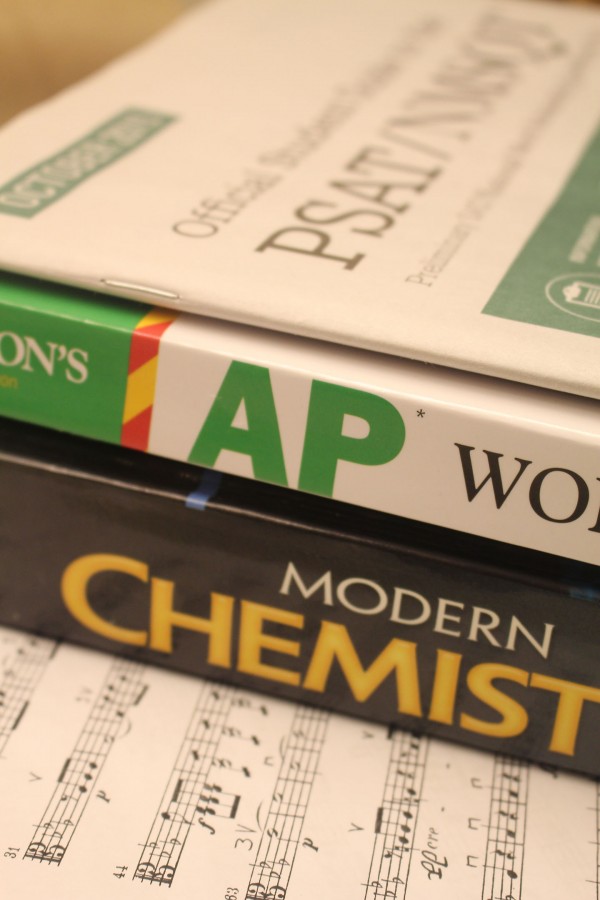The weight of AP
If you’re enrolled in three or more AP classes, then you have most likely heard the groans, the sighs of pity and the unavoidable question, “When do you sleep?” too many times to count. Advanced Placement, or AP, was once an alternate option offered with the means of giving students with a passionate interest in a subject the chance to take an in-depth, college-level class. Now, however, the negative connotation associated with the word is enough to drive anyone away from taking AP without ever considering the opportunities it provides.
In AP courses, students are exposed to a higher level of learning as well as a more competitive atmosphere, which prepares them for the reality of college. At the end of the year, students also have the ability to take a test on the subject, in which a passing grade grants the student college credit, depending on what college they attend. With enough AP classes, it is possible to accomplish an entire year of college while still in high school. However, because of the high standards AP places upon students taking the courses, it is not a class to be taken by the faint of heart.
“You need to be a motivated, skillful, organized type of individual in order to take a lot of AP classes,” said guidance counselor Mr. Idi Gaines. “You may have the ambition to take it, but we need to understand the reality of taking so many AP classes.”
When choosing applicants, colleges focus on three things: a strong GPA, the scores from a student’s ACT/SAT and the amount of leadership activities a student has partaken in, which is often expressed through the submission of a personal statement.
Gaines had recently traveled to a conference on what UC colleges are looking for in students, and he said that UC’s or private colleges are paying minute attention to the rigor of a high school student’s class schedule, rigor pertaining specifically to how many AP classes that have been taken per year.
Senior Ervin Baccay is a hopeful valedictorian for the class of 2016, and is taking five AP classes — English 4, Government, Biology, Physics and Statistics. However, often like the “type A” class of students who are drawn to such heavy course loads, he strives to balance his academic life with an extensive extra-curricular schedule, as he is the President of the Space and Engineering Academy and an active member in Robotics, Academic Decathlon, Key Club, CSF (California Scholarship Federation) and Science Olympiad.
When asked the great question, “When do you sleep?” Baccay paused for a moment, until he said with hesitation that, even with his six hours of free time per week, his average sleep amount is “on a good day six, [but] usually four.”
“The workload for all five [AP classes] combined is really heavy; and extracurricular really takes a toll on you because it reduces the time you have to do homework,” he said. “I’m continually tired during the day, so I can’t necessarily concentrate on all of my assignments or what I have to do.”
AP is not only limiting his sleep, but also his family life at home. “It really inhibits your time with your family as well. Instead of socializing with my family and having normal family bonding time, I spend most of my time doing homework or just napping.”
Despite all these sacrifices, Baccay is learning through AP what college is going to feel like and says he feels prepared. “[AP] overloads me so that college would seem easier than it actually is.”
But perhaps Baccay is an optimist, as Ms. Duff, an AP English 3 teacher, would disagree about the benefits of a heavy AP course load. “[I see in my students] incredible levels of stress, and fatigue and frustration,” she said. “And that’s why I have a problem with this.”
In the beginning of the year, Duff has students write on the back of an index card why they are taking her class, with the desire that they be brutally honest. In response, a large majority simply stated that they were in the class “for the grade bump”, or “for the GPA boost.”
Duff is worried that, in students taking the class simply for the grade bump rather than the challenge, they do not fully comprehend what the challenge of the course is going to be like and therefore they find themselves caught in a class they cannot handle.
“It’s almost like that’s the expectation, ‘course you’re gonna drown, it’s AP ‘ . . . and I don’t think that was what it was intended to feel like,” she said.
Of course, this is all entirely subjective — one cannot factor out the possibility of a group of students able to efficiently handle the workload of multiple AP classes. But for too many the stress of AP is all too real. Students take on four or five AP classes in the belief that it is the only way for them to reach a satisfactory college. AP is impressive, but it is not solitary in its importance. If 100% was a person’s high school academic focuses, 70% should be coursework, the remaining 30% extracurricular. It is imperative that when picking classes, you remain realistic as to how much you can truly handle, and then react according to it.
“Listen to your heart,” Duff said. “Pay attention to yourself and know your limits, but don’t set them too low, know your potential also.”






Alan Arroyo • Nov 24, 2015 at 3:26 pm
Marlee,
Your take on AP classes is incredibly relatable. I remember the crushing weight the AP life left on my shoulders, and that stress left me running on fumes this whole first quarter at Stanford. It’s important for high school students to know that it is important to keep your grades up. However, it’s even more important to keep their health in check. So thank you so much for writing this article and acknowledging the strain felt by AP students; it’s so important for kids to know that tackling multiple AP classes can cause as much harm as it can do good.
I guess this is just a little advice for y’all: don’t stress out! AP looks great, but colleges value many other things as well! Take care of yourselves!